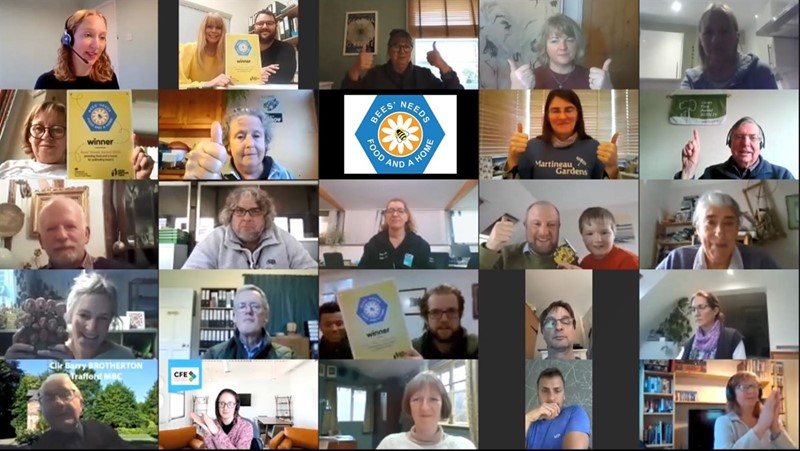Hosted by Defra and the Bee Farmers’ Association as a virtual award ceremony on Thursday 19th November, the Bees’ Needs Awards saw winners from across the country come together to receive their awards through an online event showcasing examples of great initiatives community groups, local councils, charitable organisations and inspirational farmers.
CFE were very happy to collaborate with Martin lines of the Nature Friendly Farming Network to present these awards and congratulate the worthy winners.
Farming Winners
Capes Hatherden Limited is an arable farming enterprise in North-west Hampshire which combines an impressive array of Countryside Stewardship and voluntary activity to meet Bees’ Needs on farm. More than 25 hectares of land provide pollen and nectar rich habitat for pollinators. For those of you not used to thinking in hectares, 1 hectare is 10,000 square meters, about the size of the rugby pitch.
Planting, restoring and sensitive management of the miles of hedgerow on farm provide food, flyways and shelter for bees and other pollinators Capes Hatherden. Embracing the benefits of brambles, standing deadwood and the creation log hives in woodland, as well as woodland management for flowers extend this habitat.
Alongside the wildlife-sensitive application of crop protection products and consideration for biodiversity in the productive farm business, Capes Hatherden work with local bee keeper and set up the Wessex Farm Conservation cluster group to work with other farms over 15,000 acres in the surrounding landscape.
Brothers Blair and Mark run Ellenden Farm, near Whitstable in Kent, and their achievements since embarking on a project to adopt conversation agriculture across the farm in 2018 are impressive.
No herbicides or pesticides are used anywhere on the farm and nectar rich field margins, hedgerows and species-rich grasslands provide a range of habitats and food sources for bees and other pollinators across the seasons. The farm is home to rare species of both bumble and solitary bee and Blair and Mark work with their Woodland Trust and Kent Wildlife Trust neighbours to help provide habitat connectivity in the landscape.
Their work with volunteer groups and promoting good farm environmental management through regional media make them fantastic ambassadors for the industry, and I’m sure we will hear more about their great work as it develops.
The Martin Down Farmer Cluster is a group 12 farm business working together to deliver environment benefits, including pollinator habitat, over an area of 5,000 hectares.
They work with the Game and Wildlife Conservation Trust on joined up action, delivering more than 80 hectares of new habitat creation, collecting research data and engaging both farmer and public audiences in the value of collaborative working for the environment. You can hear about the variety of actions which the members take in this video:
Martin Down Farm Cluster from Bees’ Needs on Vimeo.
Dingley Dell - special commendation
Finally, the judging panel offered a special commendation to Mark and Paul Hayward at Dingley Dell in Suffolk. The opportunities for meeting bees’ needs can vary quiet significantly between farm types, and in some cases it takes a farmer, or in this case 2, to go above and beyond to show what can be done in a farming system which we might not think would lend itself to pollinator habitat.
Dingley Dell Pork has created an astonishing pollinator banquet in and around their outdoor pig housing. They started with a plan to create enough habitat to feed 1 million bees in a day and a recent sectional survey linked to the UK Pollinator Monitoring Scheme (PoMS) showed results to suggest that they have exceeded that target in 2020.
Their work shows that where there’s a will there’s a way, and that everyone can get involved in meeting bees' needs for the future.
